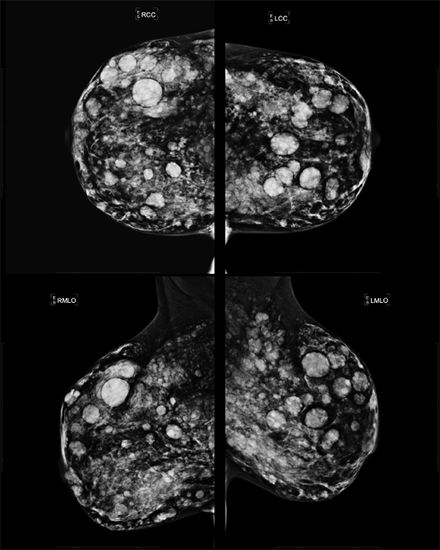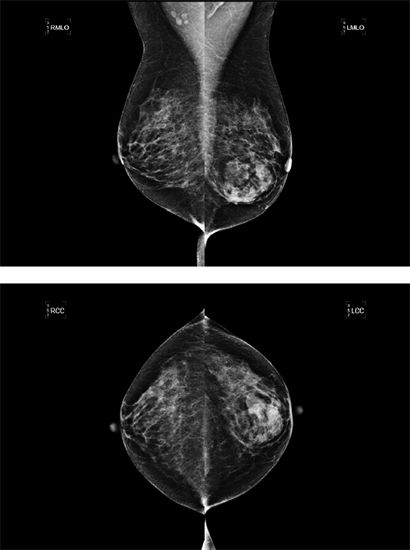Breast Imaging: A Core Review (19 page)
Read Breast Imaging: A Core Review Online
Authors: Biren A. Shah,Sabala Mandava
Tags: #Medical, #Radiology; Radiotherapy & Nuclear Medicine, #Radiology & Nuclear Medicine
D. Breast carcinoma
E. Gynecomastia
23
Diabetic fibrous mastopathy (DFM) is classically associated with which type of diabetes mellitus?
A. Type I
B. Type II
C. Type III
D. Type IV
24
Amongst the choices given below, what is the most common malignancy to metastasize to the breast?
A. Lung
B. Ovarian
C. Melanoma
D. Pancreatic
E. Stomach
25
You are shown standard CC and MLO views of a screening mammogram. Which of the following is the MOST LIKELY diagnosis?

A. Steatocystoma multiplex
B. Metastasis
C. Neurofibromatosis Type I
D. Silicone injection granulomata
26
A 65-year-old male with history of coronary artery bypass surgery, thyroid disease, and depression presents with painful, tender subareolar masses. What is the best next step, based on the provided mammographic images?

A. Ultrasound
B. Breast MRI
C. Obtaining careful drug history
D. Spot compression views
E. Biopsy and cytological analysis
27
Patient was diagnosed with right breast cancer and elected to undergo bilateral mastectomies with DIEP (deep inferior epigastric perforator) reconstructions. She now presents to her surgeon with persistent right breast skin thickening and heaviness. A bilateral breast MRI with contrast was ordered. Selected images from that examination are shown.

What is the most likely explanation for the patient’s symptoms?
A. Postoperative seroma
B. Fat necrosis
C. Recurrent tumor
D. Flap edema
28a
A 31-year-old female presents with a palpable lump in the upper left breast. Her mother was diagnosed with breast cancer at age 46. Targeted ultrasound of the area of palpable abnormality was performed. What is the MOST LIKELY diagnosis based on the ultrasound finding?

A. Complicated cyst
B. Fibroadenoma
C. Invasive ductal carcinoma
D. Phyllodes tumor
E. Simple cyst
28b
What are the typical MRI features of this mass, if this patient had a breast MRI done?
A. Enhancing mass with nonenhancing internal septations
B. Low T1-weighted and high T2-weighted signal intensity with no enhancement
C. Multiple small fluid intensity components within a heterogeneous mass
D. Type 3 enhancement kinetic curve
E. Signal loss on fat-saturated sequences
29
Which benign lesion is most likely to demonstrate a classically malignant characteristic on MRI?
A. Fibroadenoma
B. Fat necrosis
C. Simple cyst
D. Hamartoma
30a
A 28 year-old, 38-week G2P1 female presents with a painful, erythematous mass in the right breast. Which imaging modality is most appropriate for evaluating this patient?
A. Mammogram
B. Ultrasound
C. MRI
D. Chest radiograph
30b
An image from a targeted ultrasound is shown.

What is the most likely diagnosis?
A. Enlarged duct
B. Abscess
C. Malignancy
D. Hematoma
31
Which of the following would you expect to present as a spiculated mass on mammogram?
A. Medullary carcinoma
B. Papillary carcinoma
C. Phyllodes tumor
D. Tubular carcinoma
32
A 62-year-old female presents for additional views for a mammographic finding. What is the diagnosis?

A. Skin calcifications
B. Oil cyst
C. Milk of calcium
D. Vascular calcifications
33
Approximately what percentage of all breast cancers occurs in MEN?
A. 1%
B. 5%
C. 10%
D. 15%
34
Calcifications are seen on a poststereotactic biopsy radiograph of the specimen. However, the pathologist states no calcifications are seen in the specimen provided. What is the next BEST step?
A. Accept the pathology results.
B. Recommend 6-month follow-up mammogram.
C. Analyze specimen using polarized light microscopy.
D. Recommend rebiopsy.
35
You are shown a screening mammogram and CC and MLO projection magnification views. What is the MOST appropriate BI-RADS designation?

Other books
Riss Series 5: The Riss Challenge by C. R. Daems
Spirit Sanguine by Lou Harper
The Catlady by Dick King-Smith
Circle of Fire by S. M. Hall
A Rogue in Sheep’s Clothing by Elf Ahearn
Dragonwall by Denning, Troy
The Groom by Marion, Elise
The Perimeter by Will McIntosh
When In Rome...Find Yourself: A Sweet New Adult Romance by Lena Mae Hill
The Days of Redemption by Shelley Shepard Gray